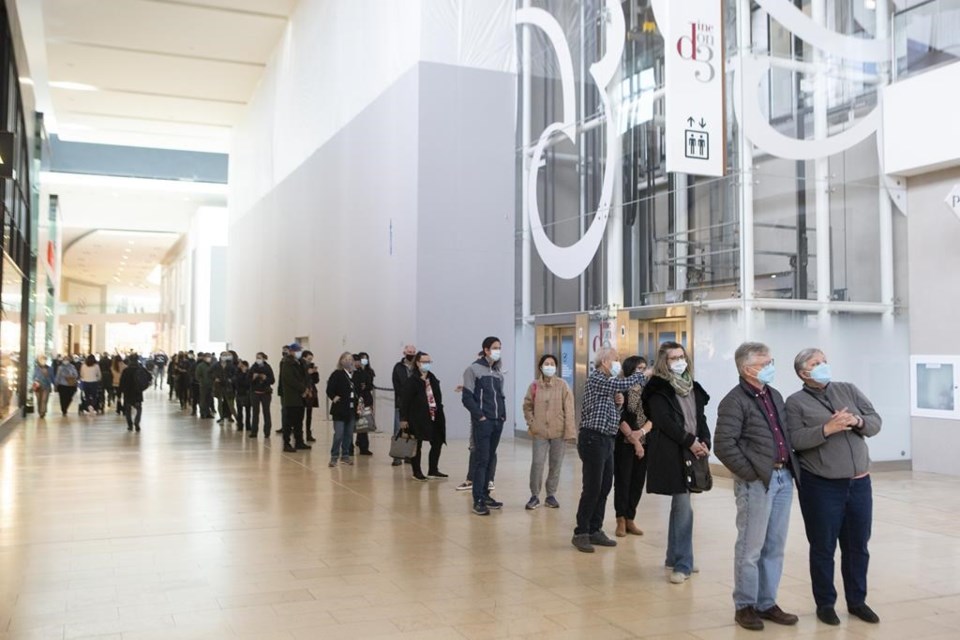TORONTO — The rampant spread of the Omicron variant drove Ontario Premier Doug Ford to tighten public health measures Friday, limiting capacity at restaurants, retailers and other venues, while capping indoor social gatherings to 10 people just in time for the holidays.
Ford was unwilling to take those steps just two days earlier when he announced an accelerated COVID-19 vaccine booster campaign, but changed his position after expert projections suggested third shots alone couldn't stop the variant from wreaking havoc in the coming weeks.
"The experts have been very clear: nothing will stop the spread of Omicron. It's just too transmissible. What we can do, and what we're doing, is slowing it as much as possible to allow more time for shots to get into arms," Ford said Friday.
The new restrictions, which kick in Sunday, will see restaurant, bar and retail capacity limited to 50 per cent, while outdoor social gatherings can have no more than 25 people – down from a limit of 100. Indoors, the gathering limit dropped to 10 from 25.
The measures also include prohibiting food and drink consumption at large venues such as cinemas and sporting arenas.
The new rules – which the province didn't put an end date on – don't apply to facilities hosting wedding ceremonies, funerals or religious services.
Ford said reintroducing the restrictions is the best thing the province can do to prevent schools from being closed to in-person learning after the winter holidays – but he noted it's still too soon to say whether it will be safe for schools to reopen, given the rapid spread of the Omicron variant.
He also left the door open to tightening restrictions further, saying that the situation was "moving rapidly." Ontario reported 3,124 new cases of COVID-19 on Friday, the highest daily tally since early May.
The premier said he knew the new rules would be hard, but that they're necessary to get past this particularly difficult stage in the pandemic.
"Friends, I know you're all tired," Ford said. "Over the last 20 months, you've been asked to sacrifice so much. We've all dug so deep. And now we need to dig a little deeper. We'll get through this."
To dig deeper, many will need to change their plans for Christmas and New Year's Eve, said Dr. Kieran Moore, Ontario's chief medical officer of health.
"It's clear Omicron won't take a holiday," he said.
Moore noted that two doses of COVID-19 vaccine are not as effective at preventing infection from the Omicron variant, so those who have yet to get a booster shot should keep their distance from older relatives.
"If you are going to interact, I'd do it outdoors with masking and distancing in place," he said. "I hope the weather stays reasonable across Ontario to enable that because we I think all of us have to learn for the last 20 months to best protect those that are older in our communities. I'm sorry to recommend that."
Ontario's panel of COVID-19 expert advisers said Thursday that daily infections could top 10,000 by Christmas without action from the province. It also warned that Omicron is predicted to push intensive care occupancy to "unstable levels'' by early January.
A day earlier, the government said it would bring in a 50 per cent crowd limit in venues with capacity of more than 1,000 starting Saturday, but the expert panel said that wasn't enough. It recommended "circuit breaker" measures that reduce contacts by 50 per cent.
Businesses reacting to the province's new measures on Friday worried what the rules would mean for their livelihoods at a time of year crucial to their bottom line.
Karl Littler, senior vice-president of public affairs for the Retail Council of Canada, said most retailers should be able to "manage," though some in high-traffic areas have expressed concern that capacity restrictions during the busy holiday season could lead to lines and delays.
"There's a bit of concern that some people might get frustrated and take that out on retail staff," Littler said, adding that while retailers know the new rules may create challenges, most want to see the impact of Omicron minimized.
"While retailers aren't thrilled by the consequences of this, I think they understand the motivation and the reasons to have a circuit-breaker," he said.
The Ontario Chamber of Commerce called for support for businesses that would be affected.
"Newly imposed restrictions intended to control the spread of the Omicron variant but that also inhibit business activity should be met with targeted relief and proportionate support programs, loan forgiveness, and extensions on payment terms," chamber president Rocco Rossi wrote in a statement.
"Provincially, many targeted supports ended months ago, and federally, they have been greatly reduced."
Opposition NDP Leader Andrea Horwath said Ford's plan was both late and incomplete. She also suggested the province bring in supports for small businesses and workers who may see financial ramifications from the new measures.
"I support capacity limits — which should have been done days ago — but it’s not the end of the changes we need to make to help people get through this wave," she said.
- with files from Amanda Stephenson.
This report by The Canadian Press was first published Dec. 17, 2021.
Nicole Thompson, The Canadian Press

